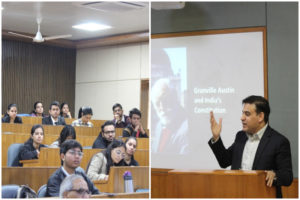
Ahead of the Republic Day, a distinguished lecture on “Glanville Austin and the making of Indian Constitution” and “Band of Sisters: The Women who founded our Republic” was organised at Institute of Law, Nirma University on 20th January 2020. The session was addressed by Lead Counsel, World Bank, USA, and eminent Constitutional Law researcher- Mr Vikram Raghavan. At the outset, Mr. Raghavan declared himself to be speaking in the capacity of a constitutional law researcher and not of lead counsel, World Bank. His address focused on the writings of eminent scholar Mr. Glanville Austin and unsung women members of the Constituent Assembly.
Mr. Raghavan talked about the remarkable research carried about by Mr. Glanville Austin who was an American historian of the Indian Constitution. He authored the enlightening and legendary text on history of Indian Constitution titled “Indian Constitution: Cornerstone of a Nation”. Mr. Raghavan discussed about Mr. Austin’s life and works. He stressed that inability to obtain the constituent assembly minutes and debates from the India library did not stop Mr. Austin’s zeal for his research. The Indian Constitution provides a history of the Indian Constituent Assembly. It discusses how and why the members of the Assembly wrote their constitution as they did. Mr Vikram pointed out that the new edition of Austin’s classic work has a preface that brings it up to date with contemporary developments in constitutional law.
Mr Vikram, in his second theme for the day, highlighted the role of unsung women members of the Constituent Assembly. He discussed the background of women’s participation in the Constituent Assembly. He talked about the immense role played by women members of the constituent assembly in shaping the Constitution. He highlighted the contribution of Durgabai Deshmukh, Rajkumari Amrit Kaur, Hansa Mehta, Begum Aizaz Rasul, Ammu Swaminathan , Sucheta Kriplani , Dakshayani Velayudhan , Renuka Ray, Purnima Banerji, Annie Mascarene, Kamala Chaudhary, Leela Roy, Malati Chaudhar, as well as well-known names like Sarojini Naidu and Vijayalakshmi Pandit. They were freedom fighters, lawyers, reformists and politicians. Many of them belonged to women’s organizations and had taken part in feminist movements. He said, women from different backgrounds and religion were part also part of the assembly reflecting diversity and inclusiveness, which is the foundation of Indian constitution.
Lastly, Mr. Raghavan reminded the students the importance of being diligent and persistent for quality research.